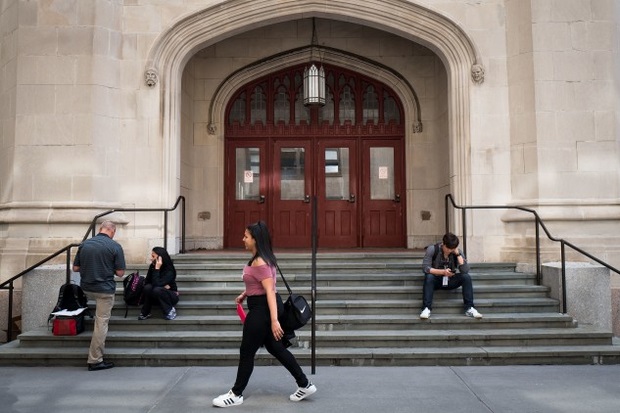Religious Colleges Praise Proposed Protections for Their Mission
- Colleges worry they could see federal funding stripped
- Proposal is part of initial draft of forthcoming regulation
The Education Department is siding with religious colleges and universities worried the accrediting agencies that oversee them won’t respect the restrictions they impose as part of their educational mission.
College accrediting agencies, which review and recognize colleges as eligible for federal funding, are required to respect the specific mission of a college. In a draft regulation issued Jan. 7, the Education Department proposed a definition of religious mission for faith-based colleges and universities and also proposed allowing the department, at an institution’s request, to review whether an accreditor has respected a school’s religious mission.
Religious colleges told the department such additional protections are needed. Shapri LoMaglio, vice president for government and external relations with the Council for Christian Colleges & Universities, said the department’s proposal was a positive change.
“The proposed changes in this area would help reaffirm institutional autonomy, give clarity regarding the scope of religious mission, and ensure that the higher educational offerings and institutions in the United States retain maximum diversity,” she said in a statement to Bloomberg Government.

The proposal is one of dozens the Education Department has put to a group of students, colleges and others meeting next week to discuss as part of the accreditation organization and financial aid rule.
Clarity of Faith
While religious colleges and accreditors haven’t clashed substantively on the issue, they got close last summer when accrediting organization Higher Learning Commission adopted a standard saying a school “ensures inclusive and equitable treatment of diverse populations,” drawing a sharp response from one religious institution.
The president of Colorado Christian University, Donald Sweeting, told the Education Department at an open listening session in September religious schools could be cut off from federal loans should the standard be adopted.
“We view these proposed wording changes as not only a powerful threat to religious liberty, but also a breaking of trust with the Higher Education Act, which guarantees respect for the religious missions of schools,” he said, according to a copy of his remarks.
Sweeting’s position was reflected by more than a dozen schools in comments submitted to the Education Department asking for clarity on the provision.
“Would respecting religious mission include such areas as curriculum? Housing? Employment? Governance?” the religious schools asked in individual but largely identical comments submitted to the department. “We believe it does, but increased clarity would help ensure this is consistently applied within and across accrediting regions.”
In Line with SCOTUS
The department also asked negotiators to reexamine under what circumstances students — whether at religious or secular colleges — qualify for federal grant and loan forgiveness programs. Currently, students borrowers are not eligible for certain programs, or to have their loans deferred, if their duties include conducting worship services, giving religious instruction or proselytizing
The proposed changes comes after a 2017 Supreme Court ruling that found a church-operated preschool could receive a federal grant to update playground equipment.
While religious groups praised the department for trying to bring its regulations into conformity with the ruling, other organizations such as the American Civil Liberties Union, said the department was “deeply misguided” in thinking a narrowly applied ruling impacted all of higher education.
In a public comment, ACLU said the department “has signaled its intent to adopt a bad-faith and erroneous interpretation of the decision in an effort to open the door to government funding of religious activities.”
To contact the reporter on this story: Emily Wilkins in Washington at ewilkins@bgov.com
To contact the editors responsible for this story: Paul Hendrie at phendrie@bgov.com; Jonathan Nicholson at jnicholson@bgov.com